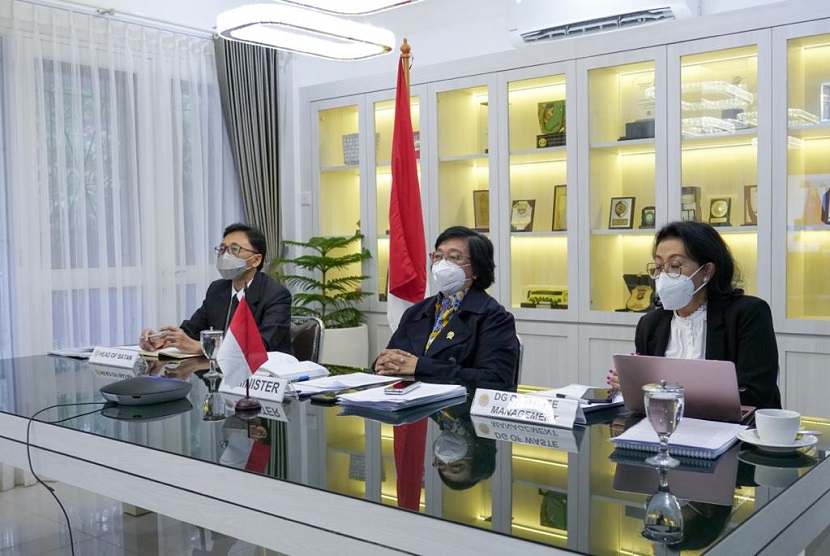REPUBLIKA.CO.ID, JAKARTA -- Minister of Environment and Forestry (LHK), Siti Nurbaya, accepted an invitation from Director General of International Atomic Energy Agency (IAEA) to become a speaker on IAEA High Level Round Table Discussion for The Asia and the Pacific Region “NUTEC Plastic: Atoms Contributing to the Search for Solutions to Plastic Pollution” which was held virtually on Tuesday (18/5).
IAEA is developing a Nuclear Technology for Controlling Plastic Pollution (NUTEC Plastic) program to support its member countries integrating nuclear technology and its derived technology on answering plastic waste problems. The main goal of this program is to increase global awareness of the effects of plastic waste in the ocean. It is also aimed to increase plastic recycle method by using radiation technique as a complement for the existing production practices.
IAEA asked Indonesia to become a Pilot Country for 3 NUTEC demonstrations phases. They are phase 1: strengthening plastic waste management in upstream sector, phase 2: building demo plant, and phase 3: upstreaming the utilization of plastic waste irradiation technology.
During her speech, Minister Siti said that Indonesia is deeply committed to decrease plastic waste, including marine plastic pollution. She explained, in the course of 3 years, plastic waste gas decreased from 615,000 tonnes in 2018 to 521,000 tonnes in December 2020.
“It means that the total of marine plastic pollution in Indonesia has decreased by 15.3 percent, both for land and sea activities. We will keep increasing out efforts to decrease waste up to 25.9 percent by the end of 2021 and up to 38,5 percent by the end of 2022,” Minister Siti said.
Minister Siti said, starting from 2020 to 2024, National Nuclear Energy Agency (BATAN) has been reviewing and conducting research development of plastic composites which is made from cellulose fiber and radio-trace microplastic, and also aquatic radioecology. “BATAN has been collaborating with IAEA in terms of nuclear energy for peaceful use. That is why IAEA appoints BATAN AS collaboration center for food and industry. BATAN keep examining and researching wood plastic composites using palm-based fiber,” Minister Siti said.
The Center for Application of Isotope and Radiation (PAIR) of BATAN has also prepared a document of implementation plan for NUTEC plastic project as a basic endorsement for Indonesia as pilot country. With this program, the usage of irradiation (polymerization) in plastic waste recycle could be developed further through industrial sector in economic scale.
Minister Siti also mentioned that the reinforcement of regulation to ensure healthy environment is a fundamental right for every people. Indonesia is actively involved in ensuring plastic waste management in many international forum, such as IGR-4 forum that generates Bali Declaration in 2018, as well as Indonesian role in formulating resolutions of marine ecosystem protection from land-based activities in UNEA-4.
Indonesia has also built Regional Capacity Center for Clean Seas (RC3S) in Bali in 2019 to boost international initiatives on marine ecosystem protection from plastic pollution. RC3S is also expected to become a center of international knowledge for plastic waste in ocean.
During the occasion, Minister Siti explained that Indonesian Government has drafted 5 long-term strategies and action plan to decrease plastic waste.
It consists of: (1) enhancing national movements to manage waste comprehensively by involving all stakeholders, supported by strong regulation, and implemented in national and regional; (2) conducting high intensity waste management in both land and sea by using technology improvement and people’s participation and initiatives; (3) strengthening plastic waste management, including marine plastic pollution from fishery activity, transportation, tourism, and housing, especially in coastal areas; (4) strengthening institutional and financial capacity building, monitoring, and law enforcement; (5) conducting research and development to encourage innovation and technology enhancement.
Closing the speech, Minister Siti appreciated IAEA for its NUTEC Plastic program that aims to help countries in Asia Pacific to integrate nuclear technology in plastic waste management. She believed this initiative will support plastic recycle strategies as an answer to plastic waste problems from upstream to downstream, by using innovation to process plastic waste into intermediate product for industrial purpose and creating new innovation for environmental friendly plastic industry.
“In this context, allow me to reassure Indonesia’s readiness to become one of IAEA pilot project. Because we see that this project will be useful in increasing our capacity to control radiation technology and strengthening our human resources capabilities,” she said.
Minister Siti hopes the integration of NUTEC Plastic program to national plastic waste management program will increase technological innovation and help reaching target of decreasing plastic waste in the long term.


